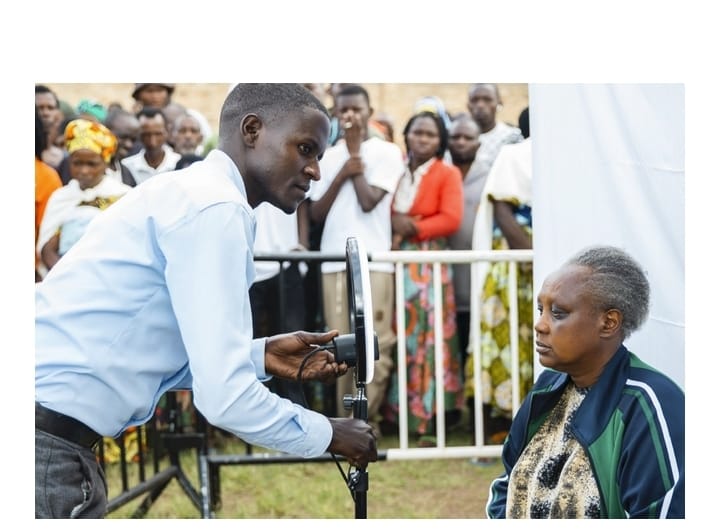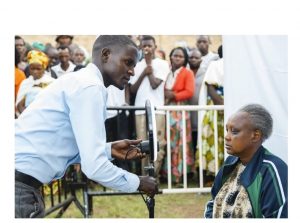Rwanda begins biometric registration for digital ID
4 min read
By Telesphore KABERUKA
The faint hum of a generator blends with morning chatter in Nyanza District, where dozens of residents queue quietly outside a community hall. Inside, a line of computers glows under fluorescent lights, each connected to a biometric kit ready to capture fingerprints, iris scans and photographs. The morning queue moves steadily forward. One by one, residents step before the camera, press their fingers on the scanner, and sign their names on a digital pad. It’s the beginning of a new chapter in Rwanda’s national identification system.
On Tuesday, October 28, 2025, the National Identification Agency (NIDA) officially launched the pilot phase of Rwanda’s long-awaited digital national ID program, starting in the districts of Huye, Nyanza and Gisagara in the Southern Province. The exercise marks the first tangible step toward replacing the paper-based national identity card with a digital, biometric version, an effort designed to modernize governance, strengthen data systems, and streamline access to services across the country.
According to NIDA officials, the pilot phase will last through November 23, covering every sector of the two districts. Field officers have been dispatched to set up registration centres in schools, sector offices and community halls. In total, 1,144 trained agents are participating in the first rollout, each equipped with laptops, fingerprint scanners and iris cameras connected to the central digital registry.
“This new system will help us build governance rooted in accurate information about citizens and their activities,” said Alice Kayitesi, Governor of Southern Province, during the launch ceremony in Nyanza. “It will not only simplify service delivery but also strengthen trust between the government and the people it serves.”
The campaign, described by officials as a “nation-building data drive,” invites all citizens to verify their existing identity records, update personal details and capture biometric information that will anchor Rwanda’s new Single Digital Identification System (SDID). This system will serve as the country’s unified digital identity platform, integrating civil registration, health, banking, tax and social security databases into a single, secure source of truth.
Residents are asked to bring their current ID cards, parents’ identification numbers, and for married couples, their spouse’s ID number. Those who never received an ID must provide their application reference number. For minors under 16, registration must be done in the presence of a parent or legal guardian.
The biometric collection varies by age: children below five will have only a photograph taken, while those five and above will provide fingerprints, iris scans and a digital signature. “The aim is to create a comprehensive, lifelong digital identity that can evolve as citizens grow,” explained an earlier briefing from NIDA.
The project is part of Rwanda’s broader Digital Acceleration Agenda, which seeks to digitize all key public services by 2026. Government documents reviewed by Family Magazine indicate that Rwf 12.2 billion (approximately US$9 million) has been allocated for this pilot phase alone, while the full rollout is projected to cost over Rwf 101 billion (roughly US$70 million). Funding is sourced from the national budget and international partners, mainly the World Bank supporting digital public infrastructure development.
For many Rwandans, the digital ID promises convenience. It will allow them to access government services, open bank accounts, or register SIM cards without the need to carry a physical card. It is also expected to reduce fraud by linking each person’s services to unique biometric identifiers. Once the system is complete, a citizen will be able to authenticate themselves with a fingerprint or face scan rather than a plastic card or paper document.
Yet alongside optimism, concerns remain. The mass collection of biometric data has triggered debate over privacy and data protection. Rwanda’s Data Protection and Privacy Law, enacted in 2021, requires consent for processing personal data, but rights advocates argue that citizens need more clarity about how their information will be stored and who will have access to it. A 2023 report by Research ICT Africa warned that without strong legal safeguards, biometric data could expose people to risks of misuse or surveillance.
NIDA insists that the new system is being built with privacy by design. “Citizens will have control over which information they share with institutions,” the agency said in a statement last week. It added that all data will be encrypted and stored within Rwanda’s national data centre, protected under strict access protocols.
At the registration site in Nyanza town, residents expressed both curiosity and pride. “It’s good that they came to us instead of calling us to Kigali,” said a farmer, smiling as she wiped her hands before the fingerprint scan. “We just hope the process is fast and that we understand what they are doing with our information.”
In Gisagara District, local officials reported strong turnout on the first day, though they acknowledged challenges such as network interruptions and the difficulty of verifying old civil records. Many elderly participants still have discrepancies in their birth dates or parental names, inconsistencies the new database aims to resolve once and for all.
The digital ID system is envisioned as the backbone of Rwanda’s digital economy, an enabler for e-governance, mobile money, and social protection. The World Bank and Smart Africa Alliance have both cited Rwanda’s model as a potential blueprint for digital identity in East Africa. By mid-2026, NIDA expects every Rwandan citizen, refugee and stateless person residing in the country to have a digital ID profile linked to their biometric data.
The national rollout will expand progressively after the Huye-Nyanza-Gisagara pilot, covering the rest of the Southern Province before reaching all 30 districts. By 2026, the government hopes to issue the first digital IDs nationwide, a milestone that will coincide with the 20th anniversary of Rwanda’s original ID card system, first introduced in 2006.






